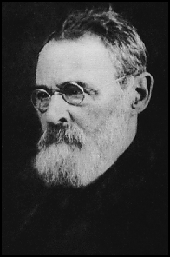Ax
Axelrod, Pavel (1850-1928)
 One of the founders of the Russian Emancipation of Labour group. After the Second Congress of the RSDLP he became a Menshevik. A Centrist during WWI.
One of the founders of the Russian Emancipation of Labour group. After the Second Congress of the RSDLP he became a Menshevik. A Centrist during WWI.
Pavel Axelrod was born in Chernigov, Russia, in 1850. Influenced by the writings of Bakunin, he established a socialist group of students in Kiev, and contributed to the radical journals, Worker and Commune.
In 1877 he joined the Land and Liberty. Three years later the group split into two factions. The majority of members, who favoured a policy of terrorism, established the People's Will. Axelrod and George Plekhanov established the Black Repartition group that rejected terrorism and supported a socialist propaganda campaign among workers and peasants.
Axelrod went with George Plekhanov to live in Switzerland and in 1883 they established the Liberation of Labour group.
In March, 1898, the various Marxist groups in Russia united to form the Social Democratic Labour Party (SDLP). The party was banned in Russia so most of its leaders were forced to live in exile. Axelrod became co-editor of Iskra. It was printed in several European cities and then smuggled into Russia by a network of SDLP agents.
At the Second Congress of the Social Democratic Labour Party in London in 1903, there was a split between supporters of Lenin and those of Martov. Lenin's a faction known as the Bolsheviks, Martov's the Mensheviks.
Along with Julius Martov, Pavel Axelrod, Leon Trotsky, Irakli Tsereteli, Moisei Uritsky, Noi Zhordania and Fedor Dan, Axelrod joined the Mensheviks.
An opponent of the First World War, Axelrod worked with Julius Martov, Antonov-Ovseyenko and Trotsky, to produce the internationalist newspaper, Our World.
After the February Revolution Axelrod returned to Russia by which time some Mensheviks had already joined Kerensky's Provisional Government. Axelrod strongly criticized those Mensheviks such as Irakli Tsereteli and Fedor Dan who now supported the war effort. However at a conference held on 18th June, 1917, he failed to gain the support of the delegates for a policy of immediate peace negotiations with the Central Powers.
After the October Revolution, which Axelrod called a “historical crime without parallel in modern history”, he toured the world rallying socialist opposition to the Bolsheviks. Pavel Axelrod died in 1928.